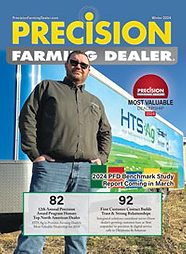Creative thinking is a mandatory skill for most precision farming specialists. This applies not only to troubleshooting a technical problem in the field, but also seeking out new sales opportunities.
Adding peripheral products to supplement primary revenue-drivers like GPS and auto-steer can help stabilize the bottom line during a downturn. But so too can taking advantage of tangential markets to sell and service precision products.
Visiting with dealers during the last month, a few talked about direct and indirect efforts to forge business relationships with specialty industries. This is in part because traditional precision sales are slower, but also to carve out a competitive niche.
One farm equipment dealer in Pennsylvania is working with a handful of local golf courses to provide RTK systems on sprayers used to treat greens and fairways. They’ve also built a self-contained sprayer with a removable display at the dealership to demonstrate nozzle control.
“We haven’t been actively marketing this tool, but if we do, I think it’s something we could probably sell to golf courses,” says the dealership’s precision ag manager. “Courses have been calling us, so I have to believe there is an opportunity there.”
The same dealership also worked with a local cranberry producer to build a floating cranberry harvester and install RTK guidance and an integrated display. The system guides the harvester and monitors the paddles to make sure the farmer isn’t missing any crop underneath the water.
The precision ag manager admits it was a chance meeting that led to the business relationship, but the customer has become a loyal customer and unexpected source of revenue.
“He’s not afraid to spend money on technology and recommended us to some farmers with cranberry bogs in Connecticut to set up the same systems,” the precision ag manager says. “There are those gems that turn up if you keep your eyes open.”
A little ingenuity can go a long way as precision dealer in Kentucky learned when he agreed to retrofit a hydraulic drive and section control with an integrated display on a tobacco setter. It would have been easy to decline the challenge, but it ended up as a $15,000 precision sale and opened the door to a new stream of annual income.
“We’ve got leads in other states now and this could easily be a $300,000 opportunity for us,” the precision dealer says. “We need to make sure we’re doing all the things everyone else can’t do and not doing all the things that everyone else can.”
But these opportunities can also pose threats. One of the dangers is dedicating too much time and effort to chasing peripheral precision sales and risk neglecting core customers. This isn’t a path dealers want to go down unless they are planning on making it a bigger part of their overall business.
As the dealer from Pennsylvania says, “You had better be able to dedicate one person if it’s something you are going to pursue because in many cases, it’s a different culture of farmer or industry, so be careful.”



![[Technology Corner] Future of Drone Use in U S Brighter After FAA Regulation Change](https://www.precisionfarmingdealer.com/ext/resources/2024/04/11/4-12-24-Slides_OTR14.jpg?height=290&t=1712932011&width=400)



Post a comment
Report Abusive Comment